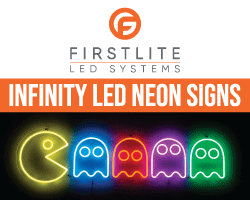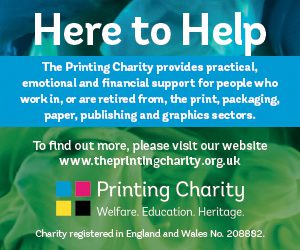As the modern print industry adapts and evolves, its professionals face unique challenges and pressures.
In this interview with Neil Lovell, CEO of The Printing Charity, we take a closer look at the mental health challenges faced by individuals in the field, the available support systems and resources, and how open conversations and a culture of support can be fostered.

EoD: How does the print industry’s demanding nature impact the mental health of professionals within the field?
 NL: The print industry has always been incredibly resilient. You only have to look at how it has evolved over the years to see how it has had to adapt, and more recently, during and post covid. Of course, despite this resilience, it does not mean it’s been easy or without significant challenges.
NL: The print industry has always been incredibly resilient. You only have to look at how it has evolved over the years to see how it has had to adapt, and more recently, during and post covid. Of course, despite this resilience, it does not mean it’s been easy or without significant challenges.
The rapid pace of change and seismic shift in working patterns to adapt to brings real challenges for organisations in our industry, as well as uncertainty for those working in those organisations. And it has come at a cost. According to the BPIF, over the last two years, the number of people employed in print has fallen by 7,000 to 98,000.
I think the challenges faced by people in print now are reflected across the UK population as a whole. People and businesses are being squeezed from every side. There’s the spiralling cost of living impacting businesses and individuals alike, plus challenges in the supply chain due to various complex local and global factors beyond anyone’s control. It’s perhaps no surprise, then, that according to the BPIF, energy costs remain the top business concern for printing companies, and consumers are feeling the same – ONS data from December 2022 shows 43% of UK adults who pay energy bills found it difficult to afford them.
Within this context, it’s understandable that mental well-being has been negatively impacted, and many people are struggling.
EoD: What are some common mental health challenges faced by individuals working in the print industry?
NL: I would expect that mental health challenges faced by people in print are mirrored throughout the general population. According to the Mental Health Foundation, one in four people in England will experience a mental health problem of some kind each year, and one adult in eight is receiving some form of mental health treatment. Mixed anxiety and depression are most common, with 8% of people overall experiencing this.
Data from the Printing Charity’s own helpline shows that people most frequently contact us about their emotional health. We also receive regular calls about relationships and family problems. However, there is a wide range of reasons why people call us, which shows how important it is to offer in-the-moment emotional support 24 hours a day, as our helpline does, because people can find themselves in crisis at any point, for a multitude of reasons. It’s also important to remind people in our sector that the helpline is not just for when someone is in crisis; we want to help before that is the case.
EoD: What support systems or resources are currently available to help print industry professionals cope with mental health challenges?
NL: It’s really encouraging to see staff well-being continuing to be top of the agenda for many, many businesses in our sector. We all know that life doesn’t always go to plan, and through our conversations with people working in print, we hear of a wide range of staff support resources on offer to help when it doesn’t.
These include Employee Assistance Programmes (EAPs); trained Mental Health First Aiders offering a first-line response to anyone needing immediate support in the workplace – in fact, one in five of the companies signed up to the helpline has at least one MHFA in place; and in-person and online support groups for specific situations, life stages and challenges; as well as all-team communications highlighting these support resources and emphasising that no-one should feel they have to struggle alone.
Our own helpline is also available entirely free of charge for businesses of any size, and any specialism, in our sector to offer to their employees. It’s really important to us that everyone in our industry has somewhere to turn when they need support, and the helpline is here to ensure that.
We know that for businesses, it can feel overwhelming to decide the best way to provide support for employees when there is so much else to be done, so that’s where we can step in and offer a solution. Our helpline is entirely ready to be deployed rapidly into new businesses as a stand-alone resource or layered alongside existing wellbeing initiatives. It makes it as easy as possible for any organisation in our sector to establish a professional support service for their staff, and the charity’s team is on hand to help make the process of launching it to employees as easy and as straightforward as it possibly can be.
As Graham Hunstone, MD of Visual Print & Design, succinctly summarises: “Being free to us as a company, using the helpline is really the best resource. It’s a no-brainer.”
We know it can be hard at times to talk about issues, but it does help to share what’s on your mind with someone who is there to listen. That’s where our helpline, and other similar resources, come into their own. Taking that first step to make a call or look online at how you can get help is such a positive move. Our counsellors provide a completely confidential and non-judgemental opportunity to talk through problems and emotions. I would encourage anyone struggling to give a little time back for themselves and make that call. It will help them to realise they are not alone.
EoD: How can open conversations about mental health be encouraged within the print industry, breaking the stigma and creating a culture of support?
 NL: The Mental Health Foundation estimates that 75% of people with mental health problems in England may not get the mental well-being treatment they need. The Foundation also found that mental health-related issues were the cause of 13% of total sick days taken in the UK. It is crucial to foster a workplace environment in which open conversations about mental health can take place, both for employees and for businesses themselves.
NL: The Mental Health Foundation estimates that 75% of people with mental health problems in England may not get the mental well-being treatment they need. The Foundation also found that mental health-related issues were the cause of 13% of total sick days taken in the UK. It is crucial to foster a workplace environment in which open conversations about mental health can take place, both for employees and for businesses themselves.
However, we know there is still some way to go before people feel they can be wholly open about their mental well-being at work.
A recent study from Nuffield Health shows 35% of UK employees had called in sick due to poor mental health but given another reason. Now, this has fallen from last year’s number, which is reflected in our conversations across the industry, with an increasing number of businesses talking about how a clear, consistent and effective well-being strategy continues to develop support networks and build resilience within their teams, making it easier for people to be honest about when they are struggling.
The more organisations across the industry talk about what they are doing to support employee mental well-being and the positive impact that has, the less taboo the subject will become. When people share the reasons why they’re committed to employee well-being and the difference that commitment makes, others realise that they are not alone.
At the charity, we are here we’re here to help keep the subject top of mind and to help those companies looking to understand how they can do more. I think we can also do more collectively as a sector, sharing best practices and focusing on the issues that matter to people working within it, creating space for these conversations to happen, and listening carefully when they do. As our network of companies using the Printing Charity helpline and benefiting from our support grows, we’d like to help lead this discussion.
EoD: What role can industry associations, trade organisations, or professional networks play in promoting mental health awareness and resources within the print industry?
NL: The fantastic associations, organisations and networks we have within our industry can play a really significant role in opening up a conversation about mental health with their members and keeping it open by making mental well-being a regular topic in their communications and at their events. Their voices are influential and, by being open about the topic, can really help to destigmatise and demystify it.
We at the charity can also offer help here. We regularly join industry events to talk about mental health support and welcome the opportunity to do this more. Please, just ask.
We would love people proactively to share information about our free, confidential helpline with their networks, enabling us to engage with the greatest possible number of eligible organisations more quickly than we can on our own, so we can be there for as many people in print as we can. We have a small team of relationship managers ready to talk to anyone who wants to know more, and as a first step, you can visit the website or call us on 01293 542 820.
Our goal is to build close, long-term partnerships with businesses using the helpline, so we can make sure the helpline is having the impact that each particular business needs it to.
We say that we may not always know when people need our help, but we want to be there when they do, and by proactively sharing information about our helpline through our own networks and those of our supporters in the industry, we can do our best to achieve this.



















